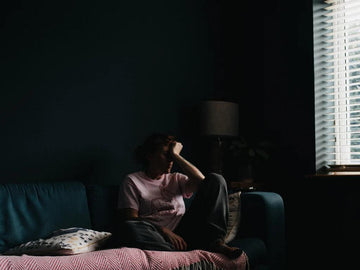If you fall into this demographic, you may be asking yourself, “Why am I always tired?” So let’s talk about how you can combat tiredness in your daily life.
The Negative Side Effects of Lethargy
Lethargy, which is a state of extreme tiredness or lack of energy, can have many negative side effects, both physically and mentally. You may already be familiar with some of these problems.
Decreased productivity
Tiredness can make it difficult to concentrate and accomplish tasks, leading to decreased productivity at work or in daily life.
Impaired brain function
Fatigue and lethargy can make it harder to remember things, make decisions, and solve problems. All signs of an unhealthy brain.
Mood swings
Lethargy can lead to mood swings, irritability, and increased susceptibility to stress and anxiety. If you’ve ever under slept, you probably know this.
Physical weakness
Prolonged lethargy can lead to muscle weakness. This can make it difficult to do things around the house or run errands.
Weight gain
Tiredness means you don’t have energy to exercise. And this can lead to weight gain or hinder weight loss efforts.
Immune system suppression
Chronic tiredness weakens your immune system, making your body more susceptible to infections and illnesses. It also makes it more difficult to get over a sickness.
Increased risk of chronic health conditions
Persistent lethargy can lead to an increased risk of developing chronic health conditions. This could include problems like obesity, diabetes, and heart disease.
Why You’re Always Tired
Feeling constantly tired or fatigued can happen for many reasons, and it could involve one or multiple factors. But the primary cause is (no surprise) a lack of sleep. Adults need 7-9 hours of quality sleep each night.
If you’re not getting enough restful sleep, you will be tired.
Why are you not getting enough sleep?
It could be because of a sleep disorder. Sleep disorders like sleep apnea, restless leg syndrome, or narcolepsy can disrupt sleep patterns and lead to persistent fatigue.
Stress and anxiety could also be playing a role in lack of sleep. Persistent worry and an overactive mind can make it challenging to relax and recharge during sleep.
You may also be struggling from depression. Depression often causes symptoms of fatigue, lethargy, and low energy. It can also disrupt sleep patterns, leading to even more exhaustion.
Certain health conditions can also contribute to trouble sleeping and a lack of energy. This could include chronic pain, anemia, thyroid disorders, diabetes, chronic fatigue syndrome, and fibromyalgia.
Or maybe you take medication that has a side effect of lethargy. Medications: Some medications may have fatigue as a side effect.
Poor diet is even associated with poor sleep. Your diet may lack the essential nutrients. Maybe you’re dehydrated. Or maybe you consume too much caffeine. These can all negatively affect your energy levels.
6 Solutions for Tiredness
If you’re always tired and experiencing any of the above negative side effects, here are some solutions for you to try.
Create an optimal sleeping environment
- Go to bed and wake up at the same time
- Sleep in a dark, cool room
- Avoid screens for at least an hour before you go to sleep
- Limit your caffeine and alcohol intake
- Do some deep breathing and/or meditation before you go to bed
Manage your stress
- Do what you can to rectify stressful situations
- Recognize that you cannot control some factors of stressful situations
- Try yoga, meditation, talk therapy, and/or listening to music that calms you
Exercise regularly
- Take a walk around the block
- Spend 20-30 minutes a day exercising
- Build it into your daily routine
Be intentional with your diet
- Eat a well-balanced diet rich in fruits, vegetables, lean proteins, whole grains, and healthy fats
- Avoid excessive sugar and processed foods
- Limit caffeine and alcohol
- Drink at least half a gallon of water a day
Take breaks and try naps (but be careful)
- If you have a sedentary job or daily routine, take short breaks to stand up, stretch, and move around
- Try power naps, but don’t let them exceed 20-30 minutes or else it could lead to more tiredness
Consider supplements

Regardless of which of these tips you try, it’s important you have the support you need. So it’s a good idea to supplement your diet with plant-based tinctures. These are a safe way to reclaim your energy without annoying mid-day crashes.
I highly recommend the Soul Drops Complete Set, which includes four adaptogenic liquid formulas meant to improve how you feel naturally. When you use all four together, the benefits are compounded.
Take SOL in the morning for more focus and a little energy boost. Take MIND during the day to avoid the afternoon crash. Take LUN at night to unwind and destress. Then finally, take COSMOS before bed to help you sleep deeply and wake up rested.
Frequently Asked Questions About Lethargy
Why do I feel so tired everyday?
There can be many reasons you feel so tired. The most common causes include a sleep disorder, stress and anxiety, depression, medications, and a poor diet.
How do I fix being always tired?
You can combat persistent tiredness by creating an optimal sleeping environment, keeping a regular sleep schedule, doing what you can to manage your stress, exercise regularly, eat healthy, and napping.




